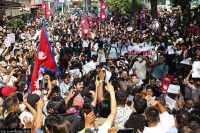National
As Non-Aligned Movement marks 60 years, many are questioning its relevance
Experts say new alliances are emerging and the world is heading to become multi-polar, so Nepal needs to tread cautiously while disengaging itself from strategic alliances.
Anil Giri
The Non-Aligned Movement is marking its 60th anniversary next week and Nepal is among the founding members—those developing countries whose basic principle is not formally aligned with or against any major power bloc.
Nepal has received an invitation from Serbia to participate in a function to be held in Belgrade on 11 and 12 October to mark the 60th anniversary of the first conference of the movement, which was first held in 1961 in Belgrade, the capital of then Yugoslavia.
While sending out the invitation to the 23 founding members of NAM including Nepal, the foreign minister of Serbia, Nikola Selakocic, said that NAM throughout its history has been a beacon of freedom to all those who sought the right to existence and prosperity in a world that was often ruled, not by the force of law, but by the law of force.
As a Nepali delegation led by Foreign Minister Narayan Khadka is to participate in the meeting of the founder members in Serbia, foreign policy experts and observers say that since a new kind of cold war is emerging, Nepal has become the centre of two rising powers—India and China—and in the midst of rapid geopolitical shift and flux, a very careful and balanced policy is needed for Nepal in this new emerging context.
“The new cold war that is emerging is not like the past one,” said Professor Sridhar Khatri, adding, “Since we are located between two major powers and we are the centre of focus geopolitically, a carefully designed foreign policy is needed for a small country like Nepal.”
Ideally, one of the fundamentals of Nepal's foreign policy is non-alignment to any major power but time and again, Nepal has shifted its goal post sometimes to India, sometimes to China and sometimes towards the Western bloc, observers say. According to the Ministry of Foreign Affairs, Nepal is to conduct an independent foreign policy based on the United Nations Charter, non-alignment principles, principles of Panchasheel, international laws and the norms of world peace, taking into consideration the country’s overall interest, while remaining active in safeguarding the sovereignty, territorial integrity, independence and national interest of Nepal.
In its initial days, major powers used to pay a lot of attention to NAM’s activities, Khatri, who headed three different think tanks in the past, said. “Now NAM has become more ceremonial and less substantive.”
“A new kind of cold war is brewing and it is definitely not going to be like the earlier one. The nature of the new cold war is definitely different than the previous one. So we have to think in a new way to cope with the emerging challenges,” said Khatri.
The non-aligned movement was born after the first declared Cold War between the pro-Soviet Union nations belonging to the Warsaw Pact and the pro-American nations belonging to the North Atlantic Treaty Organisation (NATO). The collapse of the Soviet Union in 1991 was the formal end of the first phase of the Cold War. With the emergence of China, the re-emergence of Russia and creation of several US-led security, military and strategic alliances like NATO, Indo-Pacific Strategy, QUAD and recent alliance between the US, UK and Australia (AUKUS) have resulted in a new kind of polarisation in the world and new wave of cold war is in the offing.
“Like India, one of the NAM architects, is breaking up its “deep love” with non-alignment and choosing a multi-aligned foreign policy, the movement seems like it is no longer an influential pressure group in global affairs,” Professor Khadga KC of the Tribhuvan University, said.
In July 2020, in his interaction with strategic experts of India, External Affairs Minister of India, S Jaishankar had said that non-alignment was for a specific era and a particular context.
“There were two aspects to it. One, independence. I think that remains the factor of our continuity. The other came in the 1950s and 1960s when we were much weaker. But today, people turn to us for solutions. We are not bystanders and have a contribution to make. Connectivity, maritime security, terrorism, climate change are big issues and we are a part of the discussion. And third, we are to grow by leveraging international situations. And you can’t do that by staying away. The era of great caution and much greater sense on multilateral relations is behind us. We need to take risks,” Jaishankar had said, which many saw as India’s departure from its previous stance on non-aligned movement.
Until now, Nepal has not made any significant departure or deviation from NAM, its principles and commitment.
While reaffirming Nepal’s profound commitment to the principles of NAM, the then foreign minister Pradeep Gyawali in his speech in October 2020 had said NAM should claim its rightful place and amplify the voice of the weak and vulnerable countries in their fight against the pandemic.
“NAM must prove itself as a collective voice of reason and a source of strength to its membership. For this, we, the member states of NAM, need to recommit ourselves to make the movement more effective and faithfully adhere to its principles,” Gyawali had said at the virtual ministerial meeting of the NAM on the margins of the 75th session of the United Nations General Assembly.
Just like during the Cold War, however, we small powers should protect the spirit of non-alignment in the changing global power relations i.e. emerging scenario of so-called new cold war, said Professor KC. “In the changed context, Nepal should contemplate seriously and maximize its strategies, policies and programs to benefit from the rival powers while disengaging itself from any strategic alliance.”
Some experts believe that multilateral forums like NAM and SAARC have become irrelevant as several other alliances have emerged.
“The way the new world order is evolving, we have to align one way with another. Those founders of NAM themselves are now creating and involved in other alliances. For Nepal, we have to align with one power in either way. We cannot remain neutral. If we remain neutral, then we have to say no to both the MCC and the BRI. So, NAM is the most irrelevant organization in today’s context. And, for Nepal, we need India, China, West and in some cases, the Middle East too,” said CD Bhatta, a Kathmandu based political analyst who also writes on geopolitical and strategic issues in major dailies.
Political Science professor and former Nepali ambassador to India Lok Raj Baral agrees.
“I don’t see any relevance of SAARC and NAM in today’s context. Unlike during the Soviet-US Cold War, the world is currently heading to become multi-polar. No single power can lead the present world, so new alliances and blocs are emerging in changing scenarios and contexts. Even the United States of America is creating new alliances, so how can we remain indifferent from the shift in global power and balance,” said Baral.




 21.12°C Kathmandu
21.12°C Kathmandu















